#partly because of self-identification with the thing that is literally a part of him. and partly cause he's gay for that thing
Explore tagged Tumblr posts
Text
do i believe eddie brock is homosexual or even really into men. no. to be honest. however is he gay for that alien. one hundred fucking percent and it's canonical too
#at LEAST one time he has used he/him pronouns for the symbiote#and they are in love mike costa said so. that's his love. his darling.#so. man. hashtag homosexuality. gay stuff happening in there. can't attest to what's going on exactly but i know it's queer#eddie brock is into women and is also in a deep committed relationship with that slime from space#and when the space slime is around he really barely even looks at women. and the slime gets kinda peeved when he does#was gonna say 'looks at other women'. and you know what. yeah. when he looks at other women. except the symbiote is not a girl#my take on the symbiote is that it has No indentification with the human concept of gender. like i think it Gets it. it's picked it up#from living on earth all this time and seeing into people's heads. but it's like. not human.#same with curse words. it doesn't cuss usually. it knows the words and it could use them if it wants. but it doesn't really want#however. DISTINCT from that. i think the way that EDDIE BROCK sees/feels/interprets the symbiote is something more masculine#or at least more aligned with the male side of a gender binary.#partly because of self-identification with the thing that is literally a part of him. and partly cause he's gay for that thing#believer in. he/they/it symbiote. they/them for people who are speaking about it compassionately as if it's a being of its own.#it/its for people who do Not see it as its own person or whose perspective on it is heavily influenced by the fact that it's not human.#and he/him for eddie brock. for purposes not entirely clear to the rest of mankind but absolutely tied to something gay happening there#i have talked about the symbiote's pronouns so many times with so many people in different distinct conversations this week.#currently doing my job as the world's leading thinker on venom pronoun discourse (as in conversation and theorization. not argument)#venomposting#venom
9 notes
·
View notes
Text
Dean’s Jungian Shadow Arc in S14 - Confronting the Internal Father (2x22 to 14x20)
“This meeting with oneself is, at first, the meeting with one’s own shadow. The shadow is a tight passage, a narrow door, whose painful constriction no one is spared who goes down to the deep well. But one must learn to know oneself in order to know who one is”
(Jung, The Archetypes and the Collective Unconscious 1991: p21)
Jung believed that the psyche was composed, in part, of a relation to “archetypes” (shared human psychic formations). One of these is the archetype of the father.
He distinguishes between the actual father (i.e. your Dad) and the “imago” of the father (a term he borrowed from Freud). That means, the psychological internalised construct of the father, which partly resides in the unconscious, and which is not identical to your real Dad, because it’s about your childish and foundational perception of them, but, also, for Jung (not Freud) it is linked to the archetypal (or mythic) father. The father archetype (for Jung, who has a gendered perception of the world rooted in his time-period) is about power and control. And when someone subconsciously over-identifies with the father-archetype, this results in out-of-control power fantasies:
"The danger is just this unconscious identity with the archetype, the more a father identifies with the archetype, the more unconscious and irresponsible, indeed psychotic ... he ... will be"
(Jung, 1906-1916 writings collected as Freud and Psychoanalysis: 1961:p316).
So, subconsciously over-identifying with the father-imago has negative consequences for a person, and those around them.
Let’s talk Dean, The Shadow and Dean’s Daddy Issues.
Remember this? (Gods but the colour palette was gorgeous back then).
This is Dean shooting Azazel, the yellow-eyed demon who killed his mother, Mary Winchester, with the Colt in 2x22 All Hell Breaks Loose Part II.
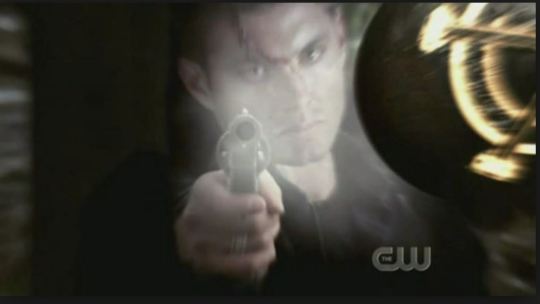

He does it with his father, John Winchester’s spirit’s help (released from Hell):

But, when I say help, remember that, symbolically, John has also been mirrored to Azazel, by means of Azazel’s possession of John (1x22 Devil’s Trap):
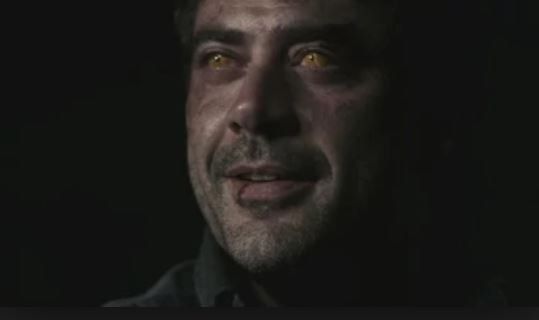
Hooboy - Daddy issues right out of the gate. That’s not news to any of us. The whole show is about “wayward sons”, after all.
Fast foward twelve years, and this is Dean (in the role of The FatherTM) almost shooting Jack, his own adopted Nephilim son (who also represents his child-self) with the Hammurabi, the mystical gun Mark II, which Chuck forged and named after an ancient Babylonian law which codifies “an eye for an eye” (i.e. a “Revenge Gun”TM):

Jack the Nephilim, whose eyes glow yellow when he is in his power, and who has (apparently) killed Mary Winchester (again):
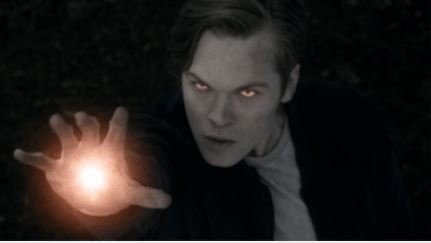
(Jack in 13x14 Good Intentions)
Notice that both scenarios - Dean, mystical gun, yellow-eyed supernatural being who killed his mother - take place in a graveyard.
Mary is dead twice (at least as far as Dean is concerned) and her death haunts the scenes.
Chuck has deliberately set up the second scenario to mirror the first (he is, in my view, testing Dean, the way he tested Abraham).
At this moment, in Moriah, we could say Dean is possessed by his Shadow, in the form of the father archetype, the Ghost of John Winchester, in his subconsious. He is ready to act out John Winchester’s revenge quest redux, and in doing so, to do violence all over again to his child-self, in the form of Jack, who symbolises child-Dean in this moment.
A repetition of the damage done to Dean himself as a child; who was forced, by the tragedy of Mary’s death, and his own father’s traumatic revenge-quest, to grow up too fast, is playing out before our eyes.
Jack-the-mirror, who lost his own mother at birth, and looks twenty-something but is only two, kneels, a willing sacrifice, in the role of child-Dean, before his father, adult-Dean, who is shadow-possessed by John’s Ghost, ready to be murdered, just as John “murdered” Dean’s childhood.
“The psychological rule says that when an inner situation is not made conscious, it happens outside as fate. That is to say, when the individual remains undivided and does not become conscious of his inner opposite, the world must perforce act out the conflict and be torn into opposing halves.”
(Carl Jung, Collected Works “Christ: A Symbol of the Self”).
Jung suggests we are subject to “fate” (i.e. our own unconscious forces taking control of our actions) when we do not confront our Shadow.
Ties in beautifully to Supernatural’s larger theme of fate vs free will, right?
Now, back then, when Dean shot yellow-eyed demon No 1, Azazel, Dean was (as his subconscious taunted him at the time) “Daddy’s blunt little instrument” (3x10 Dream a Little Dream of Me)....
Back then, Dean obeyed his father and called him “Sir”, “...following Dad’s orders like a good little soldier” (Sam in 1x10 Asylum). Sammy was the rebellious one.
When Dean stood up to his Dad, it wasn’t for himself, it was to protect Sam:
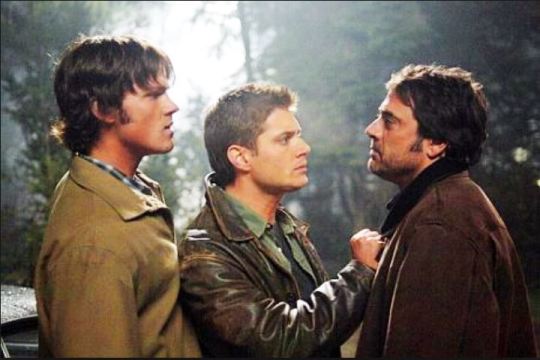
(1x20 Dead Man’s Blood).
Dean’s obedience was linked to his angel-engineered role as the Michael vessel (God’s obedient son) whilst Sam’s rebelliousness was linked to his equally engineered role as the Lucifer vessel (God’s rebellious son).
They ripped up that script and wrote their own ending in 5x22 Swan Song, but, while Sam said “Yes” to Lucifer (his Shadow-self) and beat the Devil, Dean said “No” to Michael.
S14 is the season in which Dean, having said “Yes” to AU!Michael in order to beat Lucfier (again) in 13x23 Let the Good Times Roll, undertakes his own Shadow-work.
Dabb’s Ouroboros narrative is in full swing.
Back then, John’s revenge quest, to get the yellow-eyed demon who killed Mary Winchester, became Dean’s mission too. He internalised it (even before he knew about Azazel). Sam wanted to get out of hunting, Dean was driven to follow in his father’s footsteps (whatever his real feelings and desires were, he buried them to follow the “family business”).
Here is Young!Dean in Bad Boys (9x07) looking out of the window at Young!Sam in the Impala, about to give up his happiness at Sonny’s and his young love with Robin in order to put his Dad’s way of life (hunting/ revenge), and his brother (who needs him) first:

One way a child deals with a parent who is hurting them is to want to become them, to idolise them and to believe that they’re right (Dad’s car, Dad’s music, Dad’s machismo, Dad’s heterosexuality, Dad’s way of drinking and squashing down emotion).
DEAN: “We have the coolest Dad in the world. He’s a superhero.” (3x08 A Very Supernatural Christmas).
Jung would say Dean internalised a strong identification (partly conscious, partly unconscious) with the father imago.
Dean’s been on a long, long journey to get out from under his father’s shadow. We’ve seen that struggle over many seasons.
AU!Michael in Dean’s head in S14 represented the repressive ghost of John Winchester embodied as a destructive archangel in Dean’s mind, i.e. serious crunch time for Dean’s psyche - things coming to a real crisis point for him, psychologically.
Dark!Kaia makes the parallel in 14x03 The Scar (just hear “John Winchester” for “him”):
KAIA: “You’re no different from him. Threats, violence anything to get what you want.” DEAN: “I am nothing like him.” KAIA: “Yeah you are: you always have been!”
You can read some of my previous meta on Dean’s struggle with AU!Michael as his repression/ the Ghost of John Winchester here (which also emphasises that one aspect of John’s repression of Dean is, in subtext, the repression of Dean’s queerness):
Queer Gods and Monsters (14x02)
https://drsilverfish.tumblr.com/post/179226151009/queer-gods-and-monsters-14x02
14x03 The Scar - Dean Confronts Dark!Kaia (Dopplegangers, Mirrors and John Winchester’s Ghost)
http://drsilverfish.tumblr.com/post/179463975289/shirtlesssammy-14x03the-scar-meta-writers
AU!Michael and the Closet (14x10 Nihilism)
https://drsilverfish.tumblr.com/post/182120562849/aumichael-and-the-closet
Jung and Dean’s Journey Towards Self-Integration in 14x11 Damaged Goods
http://drsilverfish.tumblr.com/post/182299438269/jung-and-deans-journey-towards-self-integration
In 14x02 we get this shot of Dean facing his mirror-self, AU!Michael, and Michael tells him, “I own you!”
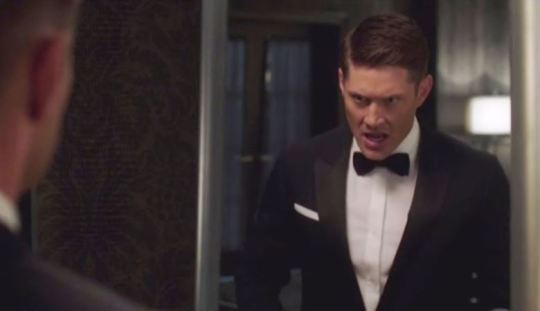
In 14x10, Dean, desperate to contain AU!Michael, manages (with Sam and Cas’ help) to lock him in a fridge-locker in his own mind:

And he says, “I am the cage!”
Dean then builds a Ma’lak box and intends to lock himself in it and throw himself (and AU!Michael with him) to the bottom of the ocean. Yikes. At the start of 14x12 Prophet and Loss, he dreams that he is alone, and terrified, in that very box:

Sam says to him about this plan (14x12 Prophet and Loss): “But what you’re talking about is far worse than death. Michael’s an archangel. He could literally keep you buried in a coffin, alive, forever.”
Remember Dean also described his possession by AU!Michael as like “drowning” over and over (14x03 The Scar):
DEAN: “I don’t remember most of what Michael did with me because I was under water. Drowning. And that I remember. I felt every second of it - clawing, fighting for air. I thought I could make it out but I couldn’t: I wasn’t strong enough.”
Now hear what is happening, psychologically...
Dean’s subconscious, his Shadow-self (aka AU!Michael representing the Ghost of John Winchester) i.e. Dean’s own self-repression and over-control, both inherited from John’s impact on him, is saying to Dean “I own you” and “I am the cage”, you will be buried in a coffin, alive, with me forever. You are under water and you can’t make it out.
That’s pretty scary right? Dean is trapped by himself (by the traumatic internalised impact of his past and his consequent over-identification with his father).
If this were IRL, we’d have given Dean the name of a good therapist, a long time ago. But it’s Supernatural, so instead Dean gets to confront the ghost of his father, John Winchester, in the flesh, in 14x13 Lebanon. He wishes on the magic pearl to get “Michael out of my friggin’ head” and lo and behold John Winchester magically appears before him (cemeting the symbolism of AU!Michael in Dean’s head representing/ mirroring John Winchester).
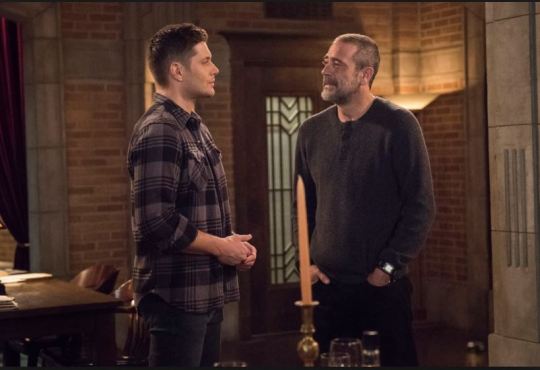
Dean gets to hear his Dad say, “You are a grown man and I am incredibly proud of you.” Dean gets to say to Sam, that he wouldn’t change anything: “I’m good with who I am. I’m good with who you are. ‘Cause our lives – they’re ours.”
He gets to tell his father he “has a family”, not a conventional one - “an angel and Lucifer’s kid”, but it’s good:
An Angel, and Lucifer’s Kid? Queer-Coding and Dean’s “Found Family” in 14x13 Lebanon
http://drsilverfish.tumblr.com/post/182794294534/an-angel-and-lucifers-kid-queer-coding-and
And he gets to choose to let his Dad go, with love. What beautiful psychological progress, huh? AU!Michael is out of his head and so is the controlling Ghost of his Father, replaced by a loving one!
But, it’s not that simple. When the pearl is destroyed, time is reset and AU!Michael is still installed in Dean’s noggin. It’s only when Dean and Cas have been whammied by the Queer Gorgon, that AU!Michael (Dean’s repression, remember) finally gets out of his mind (14x14 Ouroboros):
The Kiss of the Queer Gorgon in 14x14 Ouroboros
http://drsilverfish.tumblr.com/post/183323000224/the-kiss-of-the-queer-gorgon-in-14x14-ouroboros
Jack (Dean’s child-self mirror) kills AU!Michael (John’s repressive ghost mirror) but, the burden is great and the cost is (at least part of) his soul.
Moreover, when Mary is subsequently “killed” by Jack (you all know by now I have a theory she’s been fake re-fridged, and she’s actually been blasted into an AU, and we’ll see her again), Dean regresses. He goes back into uber-controlling mode, over-responsible mode, as a way of dealing with the fact his world has fallen apart again. Psychically (as many of you clever people have already pointed out) he’s been taken back to the trauma his 4 year old self experienced when Mary died the first time.
So, Dean puts on his control-mask, the one he learned from his Dad, and (just like John did) he focusses on dealing with the yellow-eyed “monster” who killed Mary, to contain the pain. He refuses to listen to Sam or Cas. He tells them to get on board with his (suicidal again) plan or get lost. HE is the one who instigates locking Jack (remember, also a representation of his child-self) in the Ma’lak box:
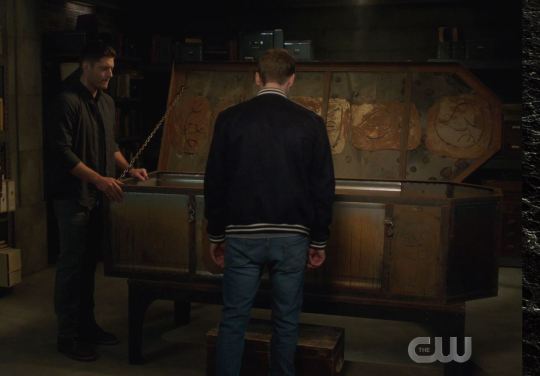
And he is the one who won’t listen to his loved ones, but jumps all over and obeys without question, the Word of God (the Law of the Father) that the only way is to shoot Jack with the new mystical gun (Colt Mark II) when Chuck shows up with it.
Displaced-in-time John said, in 14x13 Lebanon (having been filled in by his sons):
JOHN: “I-I went out takin’ out Yellow Eyes. I mean, that was the point, right? I mean, get the thing that killed mom.”
Chuck offers Dean the same choice (and, again, I think it’s a test).
Remember, as well as being the Revenge GunTM, the Hammurabi is also know as “The Equaliser”, so whatever happens to the person who is shot, also happens to the shooter. A perfect, perfect metaphor for the way in which John’s revenge quest rebounded on his sons (compounding the emotional trauma of losing their Mom).
If Dean’ follows in his father’s footsteps and shoots the yellow-eyed “demon” who killed Mary, his own adopted son Jack (who, did I mention, represents his child-self) he will die - literally, according to the “law” of Chuck’s mystical gun, but also symbolically.
Because symbolically, that choice represents the fact that Dean has been crushing the life out of himself, for a long time, thanks to the internalised Ghost of John Winchester in his head (demanding that he be a substitute-parent to Sammy, that he stay “on mission”, that he perform a certain kind of masculinity, that he is responsible for everything and everyone, that he constantly fails [because he is trying to live up to an impossible standard]).
And at the last, Dean passes the test. He says, “No,” to the ultimate Father FigureTM (God) who is shouting at him to pick up the gun and pull the trigger.
He says “No” even when Chuck promises to bring Mary back from the “dead”.
He does not repeat the cycle of his father’s revenge quest. He lowers the weapon of RevengeTM and of Re-bounding Suffering/ DeathTM.
He (finally) has compassion for Jack and thus (hopefully, hopefully) for his own child-self mirror.

On symbolic Mount Moriah, Dean confronts his Shadow-self, the part of him that is “just like” his father, the part that keeps controlling or pushing away his key relationships (with Sam and Cas and now Jack) the part that finds safety in orders, and in a black-and-white view of the world where monsters are monsters, and in which revenge is the answer.
Confronting the Shadow, as I wrote before 14x20 aired, can release us from “scapegoating”:
The Scapegoat: Speculative Musings on S14′s End (Moriah) (Linked to the Season’s Jungian Themes - Scapegoating and the Unacknowledged Shadow)
https://drsilverfish.tumblr.com/post/184068368304/the-scapegoat-speculative-musings-on-s14s-end
So, Dean says, “No” to God, the ultimate father-figure, and in doing so he is released from his Shadow-possession by the father-imago in his unconscious
DEAN: “No, my Mom was my hero, and I miss her, and I will miss her every second of my life, but she would not want this.”
As a counter-point, he embraces the feminine (his internal anima, according to Jung). He evolves.
And so, the mirror is broken through between the self and the Shadow-self, the ego and the id. AU!Michael/ the Ghost of John Winchester/ the Voice of God are out of Dean Winchester’s head. They can no longer control him: he has faced them all.
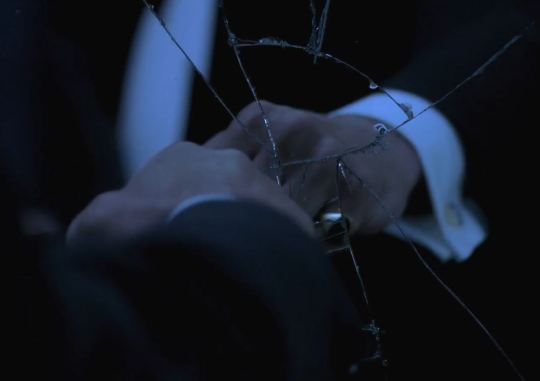
Now, Dean has to learn to be himself, a whole new final chapter in the journey.
“The shadow, when it is realized, is the source of renewal ... no progress or growth is possible until the shadow is adequately confronted and confronting means more than merely knowing about it. It is not until we have truly been shocked into seeing ourselves as we really are, instead of as we wish or hopefully assume we are, that we can take the first step toward individual reality” (Connie Zweig, Meeting the Shadow, 1990).
And, if you’ve been following the thread in the links to my other meta on Dean’s Shadow here, on how John’s repression in Dean’s mind was depicted (in subtext in S14) as, in part, Dean’s repression of his queerness (the Ma’lak box and the fridge-locker in Rocky’s mind-bar being symbols of the closet) then this culminating confrontation with the repressive image of The FatherTM in the form of God himself, as symbolic of Dean’s own controlling, self-repressing, self-closeting, Shadow-self, does seem to clear the way for... interesting developments (dramatic irony claxon - Dean still doesn’t know God is, in fact, himself bisexual).
However, as always, I caution that the overtly homoerotic denoument is more than likely to remain closeted at the last, in favour of the “familial”.
#Supernatural#14x20#Moriah#SPN meta#Meta#Dean Winchester#The Ghost of John Winchester#AU!Michael#Fate vs free will#Jung in S14#Ouroboros narrative#Dean is bisexual#still subtext#But subtext IS part of narrative
63 notes
·
View notes
Text
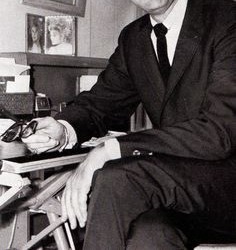
Stan the Man
Since the news of Stan Lee's death I've wanted to write something meaningful about my own feelings for him, what he represented to me as a creator and as a human being, and what kind of impact his life had on my life. For many reasons (I was dislocated by the Woolsley Fire and haven't fully settled down since our return) I haven't had a chance to give such an in-depth appraisal much thought. Honestly, I doubt I could do a full appraisal of Stan's importance in my life even under the best of circumstances. His work and presence as an icon and as a human being helped form who I am today. To write a full appreciation of Stan I'd have to write my autobiography.
Among my most vivid childhood memories is my discovery of the Fantastic Four with issue 4, the first appearance of the Sub-Mariner. I was nine years old, and I'd been a comic book reader for years at that point. I knew about Superman, I knew about Batman, I'd read the early issues of Justice League. I was a compulsive reader, voracious (still am)-- devoting hours a day to books and stories and comics and even my parents' newspapers. (Both my parents were avid readers. My dad read science fiction, my mom loved mysteries.) I vividly recall the astonished joy I felt when my mom took me to our local library and got me my first library card. I was six, I think, and the reality of a roomful of books just for kids seemed like a gift from heaven. I won all the reading awards at school-- any competition for reading the most books in a year was over as far as I was concerned the first week. By nine, I'd already graduated from "age appropriate" books for pre-teens to Heinlein's juveniles, Asimov's robot stories, and the collected Sherlock Holmes stories of Arthur Conan Doyle. I was a total reading nerd.
And then came Fantastic Four.
I've never been hit by lightning but I have to imagine the shock might be similar to what I experienced reading that early adventure of Reed Richards, Sue Storm, her kid brother Johnny, and Ben Grimm. If you weren't a comic book reader at that time you cannot imagine the impact those stories had. There's nothing comparable in the modern reader's experience of comics-- nothing remotely as transformative. (To be fair, I suppose both "The Dark Knight Returns" and "Watchmen" come close, but both remarkable works built on prior tradition and were perhaps a fulfillment of potential and creative expectations. The Fantastic Four was _sui generis_.) Over a series of perhaps five issues, a single year, Stan and Jack Kirby transformed superhero comics in an act of creative alchemy similar to transmuting lead into gold, and just as unlikely.
They also changed my life. Because Stan credited himself as writer and Jack as artist, he opened my nine year old eyes to a possibility I'd never really considered before: I could be something called a comic book "writer" or "artist."
Think about that, for a moment. Before Stan regularly began giving credits to writers and artists, comics (with a few exceptions) were produced anonymously. Who wrote and drew Superman? Who wrote and drew Donald Duck? Who wrote and drew Archie? Who knew? (Serious older fans knew, of course, but as far as the average reader or disinterested bystander knew, most comics popped into existence spontaneously, like flowers, or in some eyes, weeds.)
Stan did more than create a fictional universe, more than create an approach to superhero storytelling and mythology-- he created the concept of comic book story creation itself. Through his promotion of the Marvel Bullpen, with his identification of the creative personalities who wrote and drew Marvel's books, he sparked the idea that writing and drawing comics was something ordinary people did every day. (Yes, yes, to a degree Bill Gaines had done something similar with EC Comic's in-house fan pages, but let's be honest, EC never had the overwhelming impact on a mass audience that Marvel had later.) He made the creation of comic book stories something anyone could aspire to do _as a potential career_.
That's huge. It gave rise to a generation of creative talent whose ambition was to create comics. Prior to the 1960s, writing and drawing comic books wasn't something any writer or artist generally aspired to (obviously there were exceptions). Almost every professional comic book artist was an aspiring newspaper syndicated strip artist or an aspiring magazine illustrator. (Again, there were exceptions.) Almost every professional comic book writer was also a writer for pulp magazines or paperback thrillers. (Edmond Hamilton, Otto Binder, Gardner Fox, so many others-- all wrote for the pulps and paperbacks.) Comic book careers weren't something you aimed to achieve; they were where you ended up when you failed to reach your goal.
Even Stan, prior to the Fantastic Four, felt this way. It's an essential part of his legend: he wanted to quit comics because he felt it was stifling his creative potential, but his wife, Joan, suggested an alternative. Write the way you want to write. Write what you want to write. Write your own truth.
He did, and the rest, as the saying goes, is history.
When I picked up that issue of Fantastic Four, I was a nine year old boy with typical nine year old boy fantasies about what my life would be. Some were literal fantasies: I'd suggested to my dad a year or so earlier that we could turn the family car into the Batmobile and he could be Batman and I could be Robin and we could fight crime. After he passed on that idea I decided we could be like the Hardy family-- he could be a detective and I could be his amateur detective son, either Frank or Joe. Later I became more realistic and figured I could become an actor who played Frank or Joe Hardy in a Hardy Boy movie. In fact, by nine, my most realistic career fantasies involved either becoming an actor or an astronaut, and of the two, astronaut seemed like the more practical choice.
Stan and Marvel Comics gradually showed me a different path, a different possible career. By making comic books cool, by making them creatively enticing, and by making the people who created comics _real_ to readers-- Stan created the idea of a career creating comics.
Stan alone did this. We can argue over other aspects of his legacy-- debate whether he or his several collaborators were more important in the creation of this character or that piece of mythology-- but we can't argue about this. Without Stan's promotion of his fellow creatives at Marvel there would have been no lionizing of individual writers and artists in the 1960s. Without that promotion there would have been no visible role models for younger, future creators to emulate. Yes, some of us would still have wanted to create comics-- but I'd argue that the massive explosion of talent in the 1970s and later decades had its origin in Stan's innovative promotion of individual talents during the 1960s.
Nobody aspires to play in a rock band if they've never heard of a rock band. The Marvel Bullpen of the 1960s was comicdom's first rock band.
That was because of Stan.
For me, Stan's presence in the world gave direction and purpose to my creative life, and my creative life has given meaning and purpose to my personal life. I am the man I am today, and I've lived the life I've lived, because of him. From the age of nine on, I've followed the path I'm on because of Stan Lee. (So much of my personal life is entangled in choices I've made as a result of my career it's impossible for me to separate personal from professional.)
My personal relationship with Stan, which began when I was seventeen years old, is more complex and less enlightening. It's a truism your heroes always disappoint you, and I was often disappointed by Stan. Yet I never stopped admiring him for his best qualities, his innate goodness, his creative ambition and unparalleled instincts. People often asked me, "What's Stan really like?" For a long time I had a cynical answer, but in recent years I realized I was wrong. The Stan you saw in the media was, in fact, the real Stan: a sweet, earnest, basically decent man who wanted to do the right thing, who was as astounded by his success as anyone, and who was just modest enough to mock himself to let us know he was in on the joke. I imagine Stan was grateful for the luck of being the right man at the right place at the right time-- but it's true he _was_ the right man. No one else could have done what he did. The qualities of ego and self-interest that I sometimes decried in him were the same qualities needed for him to fulfill the role he played. In typical comic book story telling, his weaknesses were his strengths. And his strengths made him a legend and a leader for all who came after him-- particularly me.
This has been a rambling appreciation, I know. Scattered and disjointed. Like I said, trying to describe the impact Stan had on my life would require an autobiography.
When I started thinking about Stan in light of his death I realized, for the first time (and isn't this psychologically interesting?) that Stan was born just a year after my father. When I met him, as a teenager struggling with my own father as almost all teenage boys do, Stan probably affected me as a surrogate father figure. Unlike my own father, Stan was a symbol of the possibilities of a creative life. He was a role model for creative success, like other older men in my life at the time. But unlike them, he'd been a part of my life since I was nine years old. A surrogate father in fantasy before he partly became one in reality.
Now he's gone. Part of me goes with him, but the greater part of me, the life I've led and built under his influence, remains.
Like so much of the pop culture world we live in, I'm partly Stan's creation.
'Nuff said.
309 notes
·
View notes